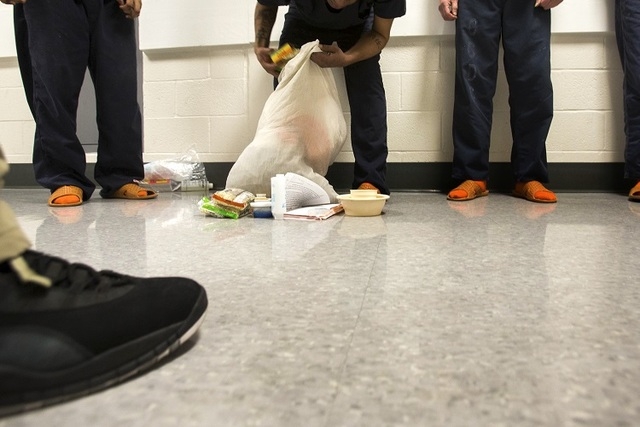Mental health program targets misdemeanor offenders
They get mental health treatment and their criminal charges are dismissed.
That’s been the case for more than 30 inmates at the Clark County Detention Center as part of a new misdemeanor diversion program that started in March.
The program was created to help divert inmates with misdemeanor and certain gross misdemeanor charges from Lake’s Crossing Center, the state’s maximum-security psychiatric facility, said Clark County District Judge Linda Bell. Instead of sending those inmates to the overburdened Spark’s facility, eligible inmates are transported to Rawson-Neal Psychiatric Hospital in Las Vegas.
“What they really need is help,” Bell said of the inmates on Tuesday. The program puts “mentally ill people in the right place, which is in the psychiatric hospital.” It also keeps them from “being a drain on the criminal justice system.”
Lake’s Crossing is the state’s only facility that evaluates the competency of inmates and provides treatment that may allow them to participate in their legal case. The facility has struggled with a backlog of patients and has faced two lawsuits on the issue.
The Clark County Detention Center, the Clark County public defender’s office, the Clark County district attorney’s office, the court system and Southern Nevada Adult Mental Health Services all make the new program happen so eligible inmates can be treated locally instead of being transported to Lake’s Crossing.
As of Aug. 15, a total of 36 inmates had been diverted to Rawson-Neal, said Capt. Herbert Baker, who oversees the staff operations bureau at the Clark County Detention Center. The detention center has seen $243,297 in bed savings as a result.
However, the percentage of the inmate population at the detention center suffering from a mental illness has seen an increase in recent months. On Jan. 1, the percentage of inmates on psychotropic medication was 25.02 percent, Baker said. On Aug. 14, that percentage had risen to a 27.32 percent. The total population currently is about 3,700.
Some misdemeanor and some gross misdemeanor offenders “end up in custody longer than they normally would because of their mental illness,” Baker said last week. Some of them could spend six to eight months in custody if they are transported to Lake’s Crossing, Bell said. Inmates who are transported to Rawson-Neal get released sooner as it’s more appropriate for their charges because they don’t have to sit at the detention center while waiting to be transported to Lake’s Crossing.
Under state statute, a person who has been convicted of a misdemeanor can be punished by imprisonment in county jail for six months or less. A person who has been convicted of a gross misdemeanor can be punished by imprisonment in county jail for 364 days or less.
Those cases “can’t even move forward,” Baker said. For example, “now they’ve been in our custody for 30 days and 30 days in Lake’s, for a total of 60 days and now their case is just starting to progress.”
Under the program, the Clark County district attorney’s office reaches an agreement with the Clark County public defender’s office on those offenders who are eligible, Bell explained. Bell then signs the order for them to be sent to Rawson-Neal.
“Rather than clogging up the courts and Lake’s Crossing with misdemeanor offenders, we send them to Rawson-Neal. As long as they get the treatment, Judge Bell will dismiss the case,” Baker said. “They have to demonstrate that they are following the (treatment) program.”
Rawson-Neal staff send a 30-day status check back to the court on how each participant is doing, and then Bell dismisses their charges without prejudice.
“When they are at the hospital, the hospital keeps them until they can be released,” Bell said.
Rawson-Neal is responsible for developing a discharge plan for every participant.
Dr. Tracey Green, the state’s chief medical officer, said some of the offenders will get their charges dropped when there’s an appropriate treatment or discharge plan.
The program currently isn’t tracking participants to see if, after they are discharged from Rawson-Neal, they end up back in detention, Bell said.
But at least the program gets people to a point where they are stable with medication and out of the detention center, she said.
“It takes the burden off the jail,” she said, which is not an “ideal” place for those offenders to be housed for a long time because what they need is mental health.
The program is also lessening the backlog of patients who need to be transported to Lake’s Crossing.
“It’s an example of what happens when all the entities involved work together — we get treatment for the mentally ill,” Clark County Deputy Public Defender Christy Craig said of the program.
The detention center is involved because there are not enough mental health services in the community, Baker said.
“County jails have become a repository for it,” he said.
Contact Yesenia Amaro at yamaro@reviewjournal.com or 702-383-0440. Find her on Twitter: @YeseniaAmaro.

















